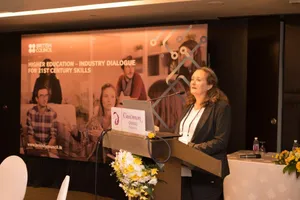IER News & blogs
Upcoming seminar: Academic mobility and employability
 Employability gain is often connected to international experiences, however, empirical findings are sparse. The Academic Mobilities and Immobilities Network (AMIN) and IER are organising a research seminar to explore research on academic mobility on 23 May. There will be presentations from Dr Toni Wright (Newham College), Eluned Jones (University of Birmingham) and Gaby Atfield (IER) focusing on: do students enrolled in UK Higher Education Institutions gain international experiences by studying or working in a different country, or by taking part in international events on the UK campus?; and do international students enhance their employability by studying in a UK higher education institution? To register and find out more here.
Employability gain is often connected to international experiences, however, empirical findings are sparse. The Academic Mobilities and Immobilities Network (AMIN) and IER are organising a research seminar to explore research on academic mobility on 23 May. There will be presentations from Dr Toni Wright (Newham College), Eluned Jones (University of Birmingham) and Gaby Atfield (IER) focusing on: do students enrolled in UK Higher Education Institutions gain international experiences by studying or working in a different country, or by taking part in international events on the UK campus?; and do international students enhance their employability by studying in a UK higher education institution? To register and find out more here.
Technology, austerity and employability in urban labour markets
 Professor Anne Green has had an article published in the journal Urban Studies. The article discusses two key changes affecting employability, labour market operation and policy delivery are austerity and the expansion of the use of information and communication technologies (ICT), especially web-based technologies. Increasingly, given pressures for cost savings and developments in ICT, employers’ recruitment and selection strategies are at least partly web-based, careers guidance and public employment services are moving towards ‘digital by default’ delivery and job seekers are expected to manage their job search activity and benefit claims electronically. It asks the question: what are the implications of austerity and technological change for employability?
Professor Anne Green has had an article published in the journal Urban Studies. The article discusses two key changes affecting employability, labour market operation and policy delivery are austerity and the expansion of the use of information and communication technologies (ICT), especially web-based technologies. Increasingly, given pressures for cost savings and developments in ICT, employers’ recruitment and selection strategies are at least partly web-based, careers guidance and public employment services are moving towards ‘digital by default’ delivery and job seekers are expected to manage their job search activity and benefit claims electronically. It asks the question: what are the implications of austerity and technological change for employability?
The article presents a critical review of the literature on ICT and its relation to, and implications for, employability in a context of austerity. A new framework for employability is presented and those aspects of employability where ICT plays a key role are highlighted. It is concluded that in the context of austerity and technological change more is demanded of individual job seekers/workers, as they are expected to take greater responsibility for their marketability in the labour market. This means that individuals’ attributes and skills are of enhanced importance in conceptualisations of employability. ICT skills have a key role to play in employability, but not at the expense of more conventional social skills which remain very important alongside digital literacy.
Green, A.E. (2017). Implications of technological change and austerity for employability in urban labour markets, Urban Studies, 54(7) pp. 1638–1654. DOI: 10.1177/0042098016631906
New article on Policies for Employability in Cities

Duncan Adam, Gaby Atfield and Anne Green have had an article published in the journal Urban Studies on 'what works' in terms of policies for employability in cities. Employability policies targeting urban job seekers have often had a ‘work first’ focus on quick job entries, neglecting sustainability and progression. This article reviews evidence on ‘what works’, drawing generic lessons from research on locally-focused urban policy initiatives in Great Britain operationalised in the context of persistent worklessness in many cities. The findings highlight the importance of employer engagement to open up job opportunities, recognising the diverse needs of individuals, the significance of personalised support for those furthest from the labour market, and co-ordination of local provision. It is argued that providers need to ensure workless groups have the skills and support to access opportunities created by economic growth. Robust local policy analysis remains challenging but important in the context of limited budgets, payment-by-results and a fragmented policy landscape.
Adam, D., Atfield, G. and Green, A.E. (2017) What works? Policies for employability in cities, Urban Studies 54(5), 1162-1177.
IER researchers contribute to the Government Office for Science Future of skills and lifelong learning Foresight project
The Government Office for Science is looking at how changes in technology and an ageing population affect what skills the UK will need in the future. The project also considers how investment in skills and encouraging lifelong learning can have a positive impact on productivity. This project aims to provide policy-makers with evidence on the current and future state of skills and lifelong learning in the UK. IER researchers have contributed to the evidence base on:
Skills and Lifelong Learning: Gaps in Training Provision - This report looks at current trends and challenges for policymakers in the UK skills system, including how geography affects provision of skills, individual access to skills and training, the role of migration and the role of careers advice.
- Green, A., Hogarth, T., Barnes, S-A, Gambin, L. and Sofroniou N. (2016) The UK's Skill System: Training, Employability and Gaps in Provision. London: Foresight, Government Office for Science.
The UK skills system: how aligned are public policy and employer views of training provision? - This report explores trends and developments in UK skills policy, employer views on training and issues in realising an employer owned skills system.
- Green, A. and Hogarth, T. (2016) The UK skills system: how aligned are public policy and employer views of training provision? London: Foresight, Government Office for Science.
The role of higher education to produce employable graduates
 Dr Heike Behle on invitation of the British Council at the Higher Education - Industry Dialogue in Sri Lanka gave a presentation on the role of higher education to produce employable graduates. Heike also demonstrated different ways to measure the employability of graduates based on her work for the LEGACY project.
Dr Heike Behle on invitation of the British Council at the Higher Education - Industry Dialogue in Sri Lanka gave a presentation on the role of higher education to produce employable graduates. Heike also demonstrated different ways to measure the employability of graduates based on her work for the LEGACY project.
